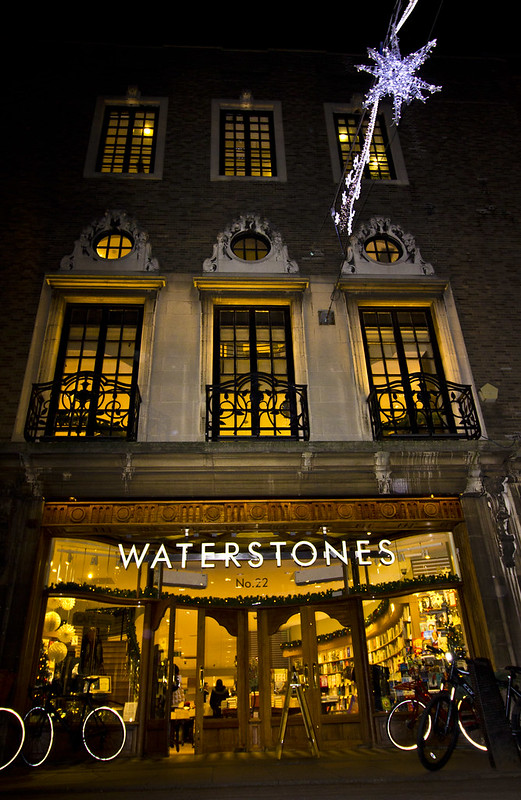Summary
Nearly 65 years after Napoleon had been vanquished by Wellington, Cambridge elected a popular chef from France who had become famous across the town for being the best in the business.
The site to the left of this place was once quite a well known hotel.
Waterstones, taken by me on a cold winter’s evening in 2017. Formerly The Dorothy Cafe and Ballroom, the building next door to this used to house the old Prince of Wales Hotel. I say ‘used to’ because much of the site was demolished in the 1920s to make way for the grand buildings we see today.
“I didn’t know we had a Prince of Wales Hotel!”
I didn’t either, until I saw it being mentioned in the papers.

The hotel and restaurant opened about six months after Monsieur Bruvet applied for a licence to sell alcohol. At first I assumed he was a former student of St John’s College, but it turns out he used to work there as a cook. One of the interesting things we pick up from the newspaper report of his licence application is the lack of hotel accommodation in town.

The above article reads as follows:
“Mr Bruvet had erected in Sidney Street, and which extended some distance down Hobson Passage. The place was intended for an hotel and restaurant, and it was to supply further accommodation of the kind which was very limited in the town. He thought the magistrates would see that the object was not so much for the sale of the article, but simply to enable the other part of the business to be carried on.”
There was no opposition to the application – interesting given the growth of the temperance movement in Cambridge of which Eglantyne Jebb and Ellice Hopkins wrote about.
“So…who was Mr Bruvet?”
Charles Bruvet was a French cook from Paris, who settled in the UK and became a very well known for his culinary skills across Cambridge. It wasn’t just the colleges he cooked for, he also did private events. One thing that stands out in the archive key word searches are the newspaper articles that praise him for his work.
Interestingly it is the Bury Free Press that has the most detailed digitised account of who he was.

The article states as follows:
“The death of Mr Charles Adolph Desire Bruvet occurred last week at the age of 58. Mr Bruvet was for a number of years one of the principal college cooks in Cambridge. He went first to Trinity (in 1863), afterwards to Downing , and subsequently to St John’s. For the last two or three years he conducted the Prince of Wales Hotel in Sidney Street, of which he was the proprietor. He at times took a prominent part in public affairs, and was sent to the Town Council in 1878 to represent the Market Ward, which office he held for two years.
“The funeral of Mr Bruvet took place on Monday afternoon at the Mill Road Cemetery. The internment was witnessed by a large number of spectators. The body was conveyed in a close hearse drawn by four horses with plumes and draperies, and six mourning coaches followed.”
Note at the end, Mr Robert Sayle, the retailer, is quoted as the undertaker.

And this is his grave at the Mill Road Cemetery – photo by the Friends of Mill Road Cemetery
“So…why did Cambridge elect a Frenchman as a local councillor?”
By the time he was selected by the Cambridge Conservatives, he had his naturalisation papers approved – as the news report of the selection meeting confirms from 1878.
 As the Cambridge Independent states:
As the Cambridge Independent states:
“He thought he was entitled to call himself an Englishman. He had got the papers from the Home Office to show that he had a perfect right to call himself an Englishman and to be a candidate for the Conservative Party to succeed Mr Mann.”
This was the by-election following the death of Cllr Mann – taking place around the same time as the annual council elections. Bruvet’s victory came as an unpleasant surprise to the Cambridge Liberals, who had expected a young Algernon Sidney Campkin to win the seat.

The name ‘Campkin’ will be familiar to more than a few residents of Cambridge. Campkin set up a pharmacy on Rose Crescent – a business that was expanded into developing photographs and selling cameras by the Howell family. Hence Campkins Cameras. Bonus points to anyone who can remember the company’s radio advert jingle from the early 1990s.

The Cambridge Independent states that for the annual elections of the council, there was only one ward that was actually contested – Market Ward. All of the others (perhaps surprisingly) were uncontested. As it turns out, Cambridge’s local elections regularly had uncontested elections up until the Second World War.
As was customary at the time, the winning candidate posted a thank you advert in the local newspapers.

Advert thanking the electorate for voting for him, by Mr Bruvet.
This was one bright point in a series of local elections where the Conservatives didn’t do that well – Liberals making gains across the country noted the Cambridge Independent. Note the UK did not get full male franchise until 1918, and did not get universal adult suffrage until 1928.
The only time I’ve found that M Bruvet got into trouble was with his dog.

“Summoned for allowing a ferocious dog to be at large unmuzzled” was the charge – after which he promised to sell the dog and pay the court’s costs.
